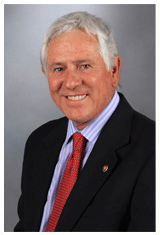JEFFERSON CITY — There is no question that one of the most important steps someone can take to escape poverty is taking a job and participating in the workforce. Less than 3% of Americans who work full time live in poverty, compared to 23.6% of those without jobs. In Missouri, we know that finding a job was the reason a household left the welfare rolls in more than four out of five cases. Therefore, it seems obvious that any anti-poverty efforts or programs would emphasize work as a path to self-sufficiency. Unfortunately, many of those government welfare programs actually act as a disincentive to work, resulting in many being trapped in long-term poverty.
The federal government currently funds 126 different welfare programs. It is unlikely that anyone could take advantage of all these, but many recipients do receive benefits from multiple programs. A recent study found that, in 33 states, welfare pays more than an $8-an-hour job. In Missouri, a typical family receiving welfare benefits could receive as much $26,837 a year making us the 30th most generous state in the country. The potential value of welfare benefits in Missouri is the equivalent of a $10.96-an-hour job which exceeds today’s minimum wage and even the minimum wage proposed by President Obama.
In response to runaway welfare spending, Congress passed the bipartisan Personal Responsibility and Work Opportunity Reconciliation Act in 1996. This gave the states more flexibility in structuring their welfare systems. While many states used this flexibility effectively, dropping welfare rolls and improving work participation, Missouri failed to implement many of the policies other states did. The result of our failure to act is that only 15% of Missouri welfare recipients are engaged in “work activities”. This is a broad definition that includes not only work, but also job training, college, and job searches. Our poor performance places us dead last in the country. Missouri’s last-place ranking struck me as completely inconsistent with our shared belief in personal responsibility and a strong work ethic. This led me to introduce a comprehensive welfare reform bill, Senate Bill 736. This bill is an attempt to take some of the ideas others states have come up with and put them into a plan that Missouri can use to reduce dependency on the government and empower more Missourians to work.
First, my bill lowers the cap on the number of months a welfare recipient is eligible for benefits. Currently, Missouri imposes the maximum lifetime limit of five years of eligibility for welfare allowed under federal law. Nine states restrict lifetime eligibility to four years or less and two neighboring states limit lifetime eligibility to only two years. My bill would also impose initial sanctions for noncompliance with work requirements. Missouri currently imposes a partial sanction, which is a less-than-complete loss of benefits, until compliance with the work requirement occurs, placing us in the bottom 25 states for this policy.
My bill also contains a family cap provision, which would remove the benefits a recipient can receive for each additional child born while on welfare. Not having this kind of policy has the unintended consequence of awarding recipients for having additional children while on welfare, thereby erecting another barrier to the workforce. Neighboring states that have family caps include Arkansas, Illinois, Nebraska, and Oklahoma. My bill also creates a new Cash Diversion Program which is designed to keep potential welfare applicants, particularly those considered “job ready” from entering the system and becoming dependent on welfare long-term. Twenty-eight states currently operate diversion programs and data suggests that between 81 and 85 percent of those using a diversion program don’t subsequently apply for welfare.
I don’t claim to have all the answers to this problem, but I do think this bill is a step in the right direction. The current system too often acts as a disincentive to work and creates long-term dependency. The ticket out of poverty is work. This will not only help the state of Missouri but, most importantly, will help these individuals achieve the dignity and self-confidence that comes with earning a paycheck and reaching their greatest potential.
As always, I welcome your ideas, questions and concerns about Missouri government. You may contact me at the State Capitol as follows: (573) 751-1480, david.sater@senate.mo.gov or by writing to Senator David Sater, Missouri State Capitol, Room 433, Jefferson City, MO 65101. |



